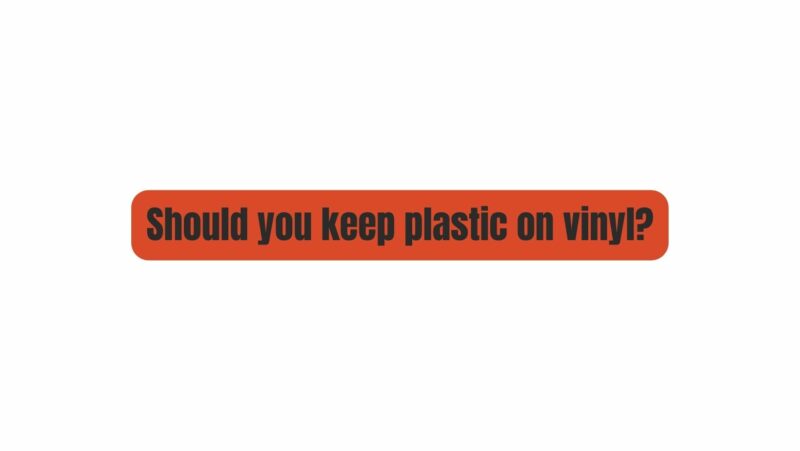In a world increasingly dominated by digital technology, the resurgence of vinyl records has been a remarkable and enduring cultural phenomenon. Audiophiles and music enthusiasts worldwide have embraced vinyl for its warm, analog sound, tangible physicality, and the nostalgia it evokes. Yet, one enduring debate among vinyl collectors concerns whether to keep the plastic wrap on vinyl records. Is it better to leave them sealed, preserving their mint condition, or to liberate them, allowing for easier access and a more tactile connection with the music? In this in-depth exploration, we will dissect the arguments on both sides of the “plastic on vinyl” debate and help you make an informed decision regarding your vinyl collection.
The Role of Plastic Wrapping:
Before diving into the debate, it’s essential to understand the role of the plastic wrapping that often envelopes vinyl records. This protective covering serves several crucial functions:
- Dust and Debris Shield: The plastic wrap acts as a shield, protecting the record’s surface from dust, dirt, and other airborne particles that can accumulate and degrade sound quality.
- Moisture and Humidity Barrier: Vinyl records are susceptible to moisture and humidity fluctuations, which can lead to warping, mold growth, and degradation of sound quality. The plastic wrap helps maintain a stable environment around the record, safeguarding it from such issues.
- Scratch Prevention: It provides a protective layer against accidental scratches, scuffs, or abrasions that may occur during handling, storage, or transportation.
- UV Radiation Shield: Ultraviolet (UV) rays from sunlight can cause fading and damage to album artwork. The plastic wrap offers UV protection, preserving the visual appeal of the album cover.
- Collector’s Appeal: For many vinyl collectors, the pristine, unopened appearance of a sealed record is an attractive aspect of collecting, increasing its potential resale value.
The Case for Keeping the Plastic On:
Now, let’s explore the arguments in favor of keeping the plastic wrap on your vinyl records:
- Preservation of Mint Condition: For collectors who view their records as investments or who simply want to maintain the highest possible condition, leaving the plastic wrap intact is a logical choice. Sealed records are often considered more valuable in the collectors’ market.
- Dust and Debris Protection: As mentioned earlier, the plastic wrap serves as an effective barrier against dust and debris, ensuring that your vinyl records remain free of contaminants that can cause surface noise and affect playback quality.
- Moisture and Humidity Control: In regions with fluctuating weather conditions or high humidity, leaving the plastic wrap on can be a safeguard against warping and mold growth, ensuring your records remain in playable condition.
- UV Radiation Shielding: If you display your vinyl records, keeping the plastic wrap on provides ongoing protection against UV radiation, preserving album artwork colors and preventing fading.
- Collector’s Pride: Many vinyl collectors take pride in having a collection of sealed records, appreciating the aesthetics and investment value of unopened albums.
- Resale Value: Sealed records tend to fetch higher prices in the collectors’ market, making them potentially more valuable for those considering selling or trading records in the future.
The Case for Removing the Plastic:
On the other side of the debate, there are valid arguments for removing the plastic wrap from your vinyl records:
- Enhanced Aesthetics and Tactile Experience: Some vinyl enthusiasts argue that the true joy of vinyl collecting lies in the physical interaction with the music. Removing the plastic wrap allows you to appreciate the album artwork and handle the record directly, enhancing the overall tactile experience.
- Immediate Access: Unwrapped records are more readily accessible for listening. You can play your vinyl without the need to open and reseal the plastic wrap each time, making it more convenient for regular use.
- Reduced Risk of Warping: In stable humidity conditions, the risk of warping is relatively low. Removing the plastic wrap can help the record breathe and reduce the potential for moisture to become trapped, which can lead to warping.
- Reduced Static Electricity: Some argue that plastic wrap can generate static electricity, which may attract dust and contribute to surface noise during playback. Removing the plastic can minimize this effect.
- Personal Connection: Vinyl records offer a unique connection to the music, and for some collectors, this connection is deepened when handling records directly, unobstructed by plastic.
The Middle Ground: Outer Sleeves:
If you’re torn between keeping the plastic on or removing it, there is a compromise: outer sleeves. Outer sleeves are clear plastic covers designed to protect the album cover while allowing the vinyl record itself to be easily accessed and handled. This option combines the benefits of protecting the album artwork while providing the tactile experience of handling the record directly.
Conclusion: The Choice Is Yours:
The decision of whether to keep the plastic wrap on your vinyl records or remove it ultimately comes down to your personal priorities and circumstances. Here are some key considerations to help you make an informed choice:
- Collecting for Investment: If you view your vinyl collection as an investment or plan to sell records in the future, keeping the plastic wrap on may be the best option.
- Frequent Listening: If you play your vinyl records regularly and value the tactile experience of handling them directly, removing the plastic wrap or using outer sleeves can be more convenient.
- Environmental Concerns: If you’re environmentally conscious, consider recycling the plastic wrap if you choose to remove it.
- Display vs. Playback: Think about whether you primarily collect vinyl for display or for active listening, as this can influence your decision.
Ultimately, the allure of vinyl records lies in the music they contain and the personal connection they offer. Whether you choose to preserve their pristine appearance or immerse yourself in the tactile experience of handling them directly, the joy of vinyl collecting remains in the music and memories it brings to life. The choice is yours, and it’s all part of the rich tapestry of vinyl culture.

